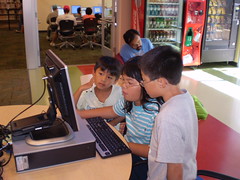
Image by San Jose Library via Flickr
Laura Fokkena, an afterschool educator, discusses the use — and misuse — of computers in afterschool programs in the Boston area. She identifies the misconception, often on the part of donors, that the greater the time spent and the more varied the technology a student is exposed to, the better. Rather, Fokkena argues that the ways in which the student uses technology is most important. Her findings were published in the Spring 2011 issue of Radical Teacher in an article titled “Moving Beyond Access: Class, Race, Gender, and Technological Literacy in Afterschool Programming.”
She highlights the distinction between technological consumption and technological production, arguing that the real benefit lies in production. A student playing a video game, or consuming media, and a student creating an art project online, or actively creating media, might appear to be using technology in equally beneficial ways. Rather, Fokkena argues that media literacy educators needs to first allow students to intuit their way to an understanding of technology in a safe environment, and then provide the guidance and expertise to educate students on how to use technology most productively.
Fokkena levies criticism against the practice of supervised, but undirected, computer use time, called “open computer.” She asserts that such practices disproportionately privilege boys over girls, experienced students over novices, and white middle-class students over non-white, while leaving all students vulnerable to advertisers.
She proposes that the most pressing technological need in afterschool programs is educated, committed, media-literate teachers who focus on technological production, rather than technological consumption.
The Spring 2011 edition of Radical Teacher can be accessed through your local public or university library, as well as subscription database services.



Thanks for the good article, I was searching for details like this, going to check out the other posts.